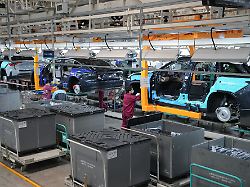World markets “flooded”
EU wants to investigate Chinese electric car subsidies
September 13, 2023, 10:32 a.m
The significantly cheaper electric cars from China have also been causing problems for German manufacturers for a long time. EU Commission President von der Leyen has therefore announced an investigation. This distorts the market.
The EU launches an investigation into government support for electric cars from China. “The price of these cars is artificially depressed by huge state subsidies – this distorts our market,” said EU Commission President Ursula von der Leyen in the European Parliament in Strasbourg. That is not acceptable. The world markets are currently “flooded by cheaper Chinese electric cars”.
An anti-subsidy investigation can lead, for example, to punitive tariffs being imposed. Measures are currently underway in several economic sectors to reduce the EU’s dependence on countries such as China and to protect domestic companies. In March, the EU Commission presented a proposal for a law on the supply of raw materials. This is intended to ensure that the EU does not remain dependent on imports from individual countries such as China for important raw materials. Europe is open to competition, but not to an unequal race to the bottom, said von der Leyen. “We must defend ourselves against unfair practices.”
The automotive industry and the switch to electric drives is a “crucial industry for a clean economy – with enormous potential for Europe,” said the Commission President. At the same time, the EU has not forgotten “how China’s unfair trade practices have affected our solar industry.” A few years ago, many companies were forced out of the market by heavily subsidized Chinese competitors. This should not be repeated with electromobility.
At the same time, she emphasized that it was essential to maintain dialogue with China. There are issues on which we need to work together. At a planned EU-China summit this year, she will take the position that risks should be minimized but not decoupled.
